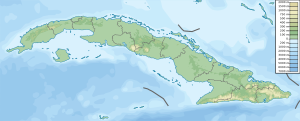Sabana-Camagüey Archipelago facts for kids
The Sabana-Camagüey Archipelago (which means Archipelago of Sabana-Camagüey in Spanish) is a long chain of islands. It is located off the north-central Atlantic coast of Cuba. This amazing group of islands stretches along the northern shores of several Cuban provinces. These include Matanzas, Villa Clara, Sancti Spíritus, Ciego de Ávila, and Camagüey. To the north, it faces the wide Atlantic Ocean.
The archipelago runs from the northwest to the southeast. It stretches for about 475 kilometers (295 miles). This distance is from the Hicacos Peninsula and Varadero all the way to the Bay of Nuevitas. The whole island system covers a huge area of over 75,000 square kilometers (29,000 square miles). It is made up of about 2,517 small islands and cays. A cay is a small, low island made of sand or coral. The islands in the eastern part of the archipelago are known as the Jardines del Rey. This group includes famous islands like Cayo Coco, Cayo Guillermo, and Cayo Romano.
Contents
Protecting the Environment
The Sabana-Camagüey Archipelago is a very special place for nature. It has important coastal and marine environments. Because of this, there are many projects working to protect it. These projects get help from groups like the Global Environment Facility and Environment Canada.
One key part of this protection is the mangrove forests and coastal forests. These trees act like a natural wall. They help protect the sensitive ocean environment from farming activities on the coast. The Sabana-Camagüey area includes the Bay of Buena Vista Biosphere Reserve. This is a special area where nature is protected. It also has the Caguanes National Park and important wetlands in northern Ciego de Ávila Province. In total, there are 35 protected areas within this archipelago.
Islands of the Archipelago
The Sabana-Camagüey Archipelago is divided into two main parts. These are the Sabana section and the Camagüey section. Each section has many beautiful cays.
Sabana Section Islands
- Cayo Piedras
- Cayo Cruz del Padre
- Cayo Blanco
- Cayo Cinco Leguas
- Cayo Ingles
- Cayo Falcones
- Cayo Megano
- Cayo Blanquizal
- Cayo Sotaviento
- Cayo Verde
- Cayo Hicacal
- Cayo La Vela
- Cayos de Pajonal
- Cayo Fragoso
Camagüey Section Islands
- Cayo Frances
- Cayo Santa Maria
- Cayo Caiman Grande
- Jardines del Rey
- Cayo Guillermo
- Cayo Coco
- Cayo Judas
- Cayo Romano
- Cayo Paredon Grande
- Cayo Megano Grande
- Cayo Eusebio
- Cayo Cruz
- Cayo Guajaba
- Cayo Sabinal
- Cayo Confites
More to Explore
- Geography of Cuba
See also
 In Spanish: Archipiélago de Sabana-Camagüey para niños
In Spanish: Archipiélago de Sabana-Camagüey para niños


